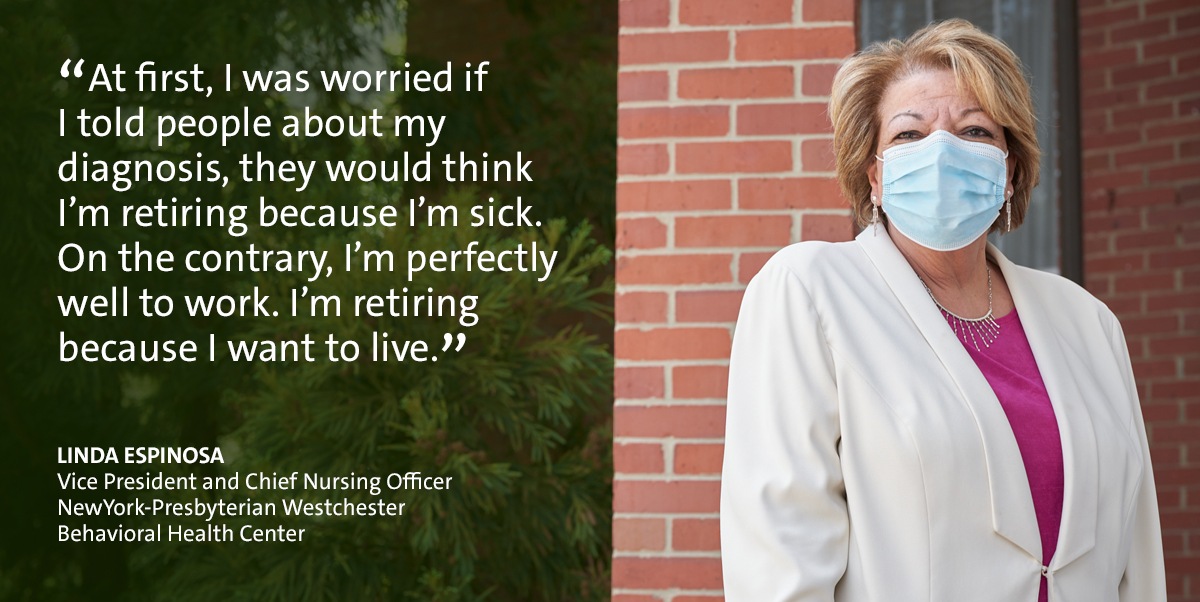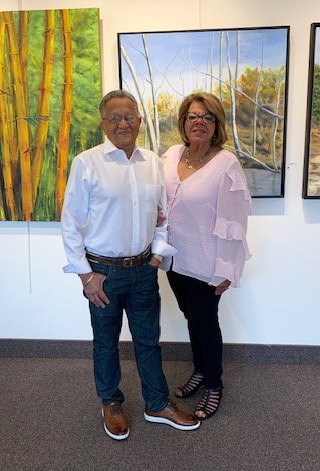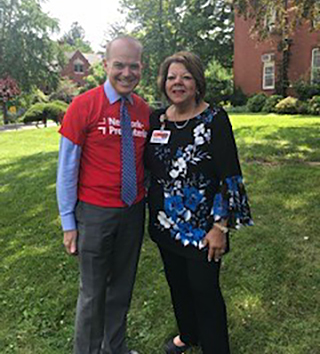A Legacy of Hope
As Linda Espinosa plans to retire after 44 years at NewYork-Presbyterian Westchester Behavioral Health Center, the chief nursing officer reflects on earning high honors, fighting a private battle with cancer, and always giving her patients and colleagues reasons to find joy.
In 2021, Linda Espinosa, then the chief nursing officer at NewYork-Presbyterian Westchester Behavioral Health Center, shared with Health Matters her journey as a nursing leader and how she faced a cancer diagnosis. Sadly, she passed away on November 19, 2022. Below is her original first-person account.
“It’s stage four lung cancer.”
Linda Espinosa pauses for a moment as she lets the weight of those five words fill the air in her office at NewYork-Presbyterian Westchester Behavioral Health Center.
After a long silence and a deep breath, the vice president and chief nursing officer then admits that, even though she was diagnosed in 2020, “This is the first time I’ve even said these words out loud.”
Over the past year, as she led her staff of more than 700 through the gauntlet of the COVID-19 pandemic, Espinosa never divulged or even hinted to her co-workers that she was waging a private battle with advanced cancer. “I spent the whole year undergoing treatment, and I didn’t tell anyone about it,” says Espinosa, who endured courses of chemotherapy, radiation, and immunotherapy. “I kept it to myself. [My staff] did not have a clue that I was sick.”
In fact, few knew that Espinosa has beaten cancer, not once, but twice in recent years —colorectal cancer in 2018 and her first bout of lung cancer in 2019.
Since Espinosa started working as a new graduate staff nurse at age 21 at what is now known as NewYork-Presbyterian Westchester Behavioral Health Center, she has made it a point to get to know her co-workers as she rose to become vice president in 2007 and chief nursing officer in 2016. But when it comes to her personal life, Espinosa says she chose not to share any of her cancer news with her colleagues in part because “I’m a very private person.”
She also admits that concerns about what people might think and a deep sense of professional pride also influenced her decision. “I didn’t want people to see me as having a weakness or not being capable of doing my job,” Espinosa admits.
In recent months, however, as Espinosa prepares to retire after 44 years of service at NewYork-Presbyterian, she has realized there is strength in being vulnerable.
“There’s probably a lot of people like me out there who have underlying medical issues or even emotional issues, and they’re afraid to appear weak so they keep it to themselves,” she says. “But I’ve learned a lot of lessons. I lost a lot by not talking to people. By not sharing what I’d been going through, I robbed myself of a lot of support that I could have gotten all this time.”
It’s a mistake that she now wants to help others avoid by sharing her story with Health Matters. In her own words, Espinosa opens up about how she felt “duplicitous” as she struggled with cancer unbeknownst to those around her; what her staff said when she finally shared her diagnosis; and how she continues to remain hopeful as she looks to her next chapter post-retirement.

Facing Cancer
Espinosa first learned she had colorectal cancer in 2018 and was deemed cancer-free after a year. But a new lung cancer diagnosis in 2019 came as “a big surprise.”
Up until about three and a half years ago, I was someone who had never been in the hospital as a patient. I didn’t frequent doctors’ offices. I was healthy. I was traveling.
In 2018, I began not feeling well and was diagnosed with pulmonary arterial hypertension, which is a serious disease. I was hospitalized at NewYork-Presbyterian/Weill Cornell Medical Center, and I’ve been treated with medication for all these years and have been asymptomatic.
But right after getting that diagnosis, I received a diagnosis of colorectal cancer. I had not had a colonoscopy in many years so I wound up feeling, still to this day, a lot of shame that I was not taking better care of myself and afraid to have an exam that could save my life.
That year, I underwent surgery, chemotherapy, and radiation. At the time, I made the decision not to tell people about my cancer because I didn’t want people to see me as being weak. I didn’t want anyone to see me as being less capable.
At one point, I went through six weeks of daily radiation — Monday through Friday, every day. I arranged to have the radiation in White Plains so I could go for my treatment and then rush to work. I never missed a meeting, and I took great pride in that. Many times I had some fatigue, but I really felt committed and dedicated to doing my job.
Coincidentally, 2018 is also the year we were really gearing up for our Magnet designation. [The American Nurses Credentialing Center’s Magnet Recognition Program is the highest and most prestigious distinction that a healthcare organization can earn for nursing excellence and innovation.] We were the first campus at NewYork-Presbyterian to achieve Magnet status. That took a lot of work, but that was the highlight of my career, and I’m very proud of that.
I remember actually being in my office in December to receive the call that we were designated. I had just gotten out of the hospital three days before, and people did not know that. Back then, I took a lot of pride in keeping quiet and being strong.
By 2019, I thought everything was fine. But on a routine PET scan follow-up for my colorectal cancer, they found the nodules on my middle lobe. At first, they thought the cancer had spread from the colon. But when they did a biopsy, they found that it was a new primary cancer. Lung cancer was a big surprise because I was asymptomatic. I quit smoking 23 years ago, but we don’t know whether or not that’s related.

Linda Espinosa and her husband, Antonio, in 2019.
So the bad news was that it was another primary cancer. The good news was that it was a small nodule, and the feeling was that it could be removed by surgery and I wouldn’t need treatment.
In the spring of 2019, I had my middle lobe removed, and again, I did not tell anyone about that. In fact, I didn’t even take sick time. I took a vacation week! I bounced right back and came to work. In fact, less than three months later, I was in Turks and Caicos with my husband.
I lived the rest of 2019 with the notion that I was cancer-free. However, at the beginning of 2020, they found nodules on both lungs. Again, lung cancer. Only this time, it was stage four lung cancer. The cancer spread from one lung to the next.
Facing COVID
Right after Espinosa received her devastating diagnosis, New York City was confronted with the rapid spread of the coronavirus. Instead of stepping back, Espinosa stepped up and reported to the front lines every day while juggling various cancer treatments in her off-hours.
Looking back at this past year and seeing firsthand what the nurses did for patients and their families was both heartbreaking and heartwarming. Imagine being the only person with a patient when they’re taking their last breath and being a proxy for their family member. You’ve heard nurses and healthcare workers being referred to as heroes all year. They were.
Since I was a teenager, I wanted to be a nurse because I always saw myself in a helping profession. I didn’t know what kind of nurse I wanted to be. But when I went to my program at Mount Saint Mary College and I had my psych rotation and then my leadership rotation, those two specialties really spoke to me. So from day one, I felt that being a psychiatric nurse was where you really got to learn about the whole patient.
We’re in psychiatry, so we didn’t see patients dying from COVID. Our COVID-positive patients were medically stable. But imagine being depressed or psychotic or imagine being a kid with schizophrenia and not being able to have visitors in a psychiatric hospital. Or imagine being a parent handing your child over to strangers in a psychiatric hospital for the first time.
The nurses stood in for these families, and I couldn’t be prouder of my nursing staff. Everybody on staff has a story, whether it’s their own comorbid medical issues, they live with an older parent, they have a child, or they’re pregnant. Yet they all came to work every day and cared for our patients.
I spent the whole COVID year essentially undergoing treatment, and this is something I didn’t tell anyone about either. I kept it to myself. People have since asked me, “How did you come to work every day during the pandemic knowing that you were at risk and that you had this underlying condition?” My first thought was always, “How can I expect my staff to come to work and put themselves at risk if I’m not willing to do that myself?” I didn’t give it a second thought.
Around my birthday this past February, I began to really ruminate about the fact that I was not telling people about my lung cancer diagnosis. I began to feel duplicitous in my relationships. I work very closely with people. I would talk to them all the time about their weekends, their days, their lives, knowing full well that I was going to spend the next weekend having treatment and they don’t know anything about that. Here they are sharing their lives with me, and I wasn’t sharing my life with them. How can you really be close and authentic with people if you’re hiding a whole part of yourself?
If I could just inspire one person to seek the support that they deserve, I feel that telling my story is worth it.
Linda Espinosa
Facing Her Co-Workers
In the wake of the pandemic, Espinosa decided she was ready to let her colleagues in and share her lung cancer diagnosis as well as her plans to retire. Her story left an immediate impression on her nursing staff.
I made the decision that I was going to start telling people my story. I didn’t know how or when, but I felt that I really needed to tell people. I shared my news [in early March] with a couple of nursing leaders. I told them that I’d been wanting to tell them something for a long time because I haven’t felt that I was being honest with them. I told them about my diagnoses and what I’ve been going through the last couple of years. And I told them that I wanted to tell them because I felt close to them.
They were very honored — that is the word they used — that I trusted them enough to tell them my story. There were some tears. They felt very badly, but most of all, they were shocked because they saw me every day at work and had no idea.
Someone then came to my office afterward and spoke to me about how my story resonated with her. This is someone who is very introverted, and when I talked about how one needs to be more transparent and how I robbed myself of support, she said she actually learned a lesson. So if I could just inspire one person to seek the support that they deserve, I feel that telling my story is worth it.
I feel very happy about the decision I made to tell people about my story. I’ve been experiencing an awakening. I don’t know how else to say it, but it’s true. I can’t tell you how happy it’s made me to be open and free. I feel like a new person in some respects.
Facing the Future
After completing a round of radiation earlier this year, Espinosa is currently undergoing immunotherapy, which consists of one infusion every three weeks. She is responding well to treatment. Looking ahead to this summer, Espinosa is eager to spend more time with her family after her retirement. And when she looks back at her incredible career at NewYork-Presbyterian Westchester Behavioral Health Center, Espinosa says she simply wants to leave behind a “legacy of hope.”
We just lived through a COVID year —and we’re still experiencing it. On top of what I’ve been going through medically, the last year really shifted my priorities and helped me decide that I should retire.
At first, I was worried if I told people about my diagnosis that they would think that I’m retiring because I’m sick. On the contrary, I’m perfectly well to work. I’m perfectly capable physically. I’m retiring because I want to live. I want to live my life in the present, and I want to enjoy my time with my family.
My last day at work is June 4. The day after, we’ll be heading to the Jersey Shore, where I rented a giant house where the family, who have been vaccinated, will convene and celebrate a couple of birthdays and my retirement. And then as soon as I feel it’s safe to fly, my husband and I will be off to Turks and Caicos.
One of the most meaningful things about being a nurse, especially in psychiatry, is the difference that you can easily make in someone’s life or in their day. Psychiatric patients sometimes, like any other specialty, lack hope. So through interactions with patients, we instill hope with the families, and countless times, we make a difference in patients’ lives. As a leader, I also felt that I was able to inspire other nurses and other mental health professionals to help patients regain their hope.
Part of what I want to leave behind is a legacy of hope. When I got my diagnosis of stage four lung cancer, it was very difficult for me to face that and have hope at the same time. But what I’ve learned after living through a year of COVID is that one can have hope — even when it seems hopeless.
If there’s not a hopeful future, there’s certainly a hopeful present. That’s what I’m still working on: to be in the moment. You can be in the present and, even when things feel dire, if you open yourself up to the possibilities of hope, there are still so many things to be hopeful for. I know that there are new treatments developed every day — perhaps not a cure, but a means to live longer with a better quality of life. So no matter the news, no matter the situation, there is always hope.
*This interview was edited and condensed.
Dear Linda:
I want to thank you on behalf of all of us at NewYork-Presbyterian Westchester Behavioral Health Center for the world-class leadership you have provided our campus.
When we put patients first in everything that we do, we think Linda Espinosa.
When we improve the quality of our care and make it safer, we think Linda Espinosa.
When we push ourselves to become more engaged in our work, we think Linda Espinosa.

Linda Espinosa with Dr. Philip J. Wilner at an Employee Appreciation celebration in 2019.
We all owe you an enormous debt of gratitude, as does every patient, family member and visitor to our campus. The excellence that we have achieved and strive to advance derives from the inspiration of one person, Linda Espinosa. We are grateful for these lessons and will carry them with us always.
With gratitude and respect,
Philip J. Wilner, M.D.
Senior Vice President & Chief Operating Officer
NewYork-Presbyterian Westchester Behavioral Health Center
Executive Vice Chair, Department of Psychiatry
Weill Cornell Medical College
